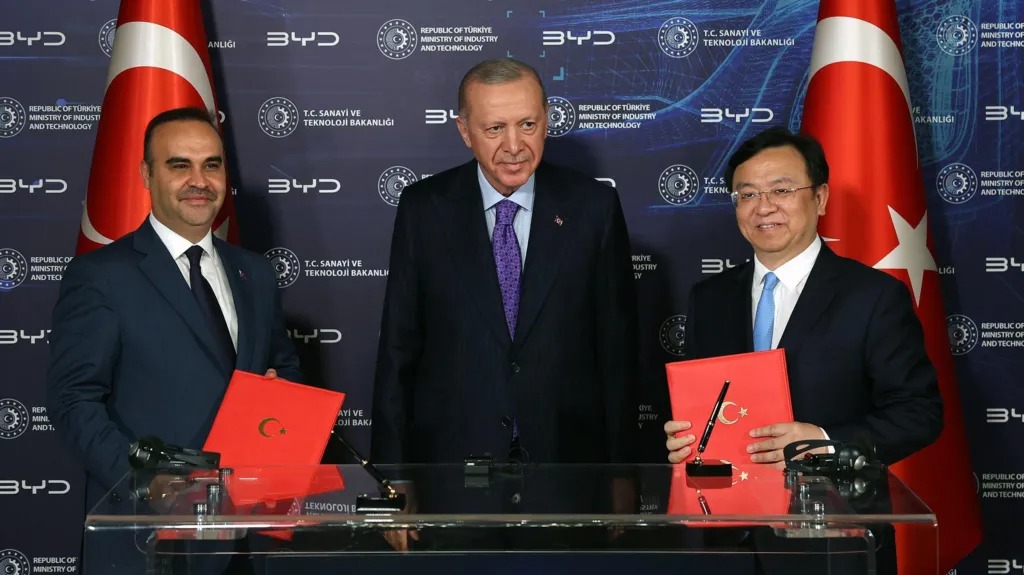BYD Strikes $1 Billion Deal to Establish Manufacturing Plant in Turkey
BYD, China's preeminent electric vehicle (EV) manufacturer, has signed a landmark $1 billion (£780 million) agreement to construct a state-of-the-art manufacturing facility in Turkey. This strategic move underscores BYD's relentless expansion beyond its domestic market.
The forthcoming plant, heralded by Turkish state news agency Anadolu, is projected to manufacture up to 150,000 vehicles annually. This significant investment is anticipated to generate approximately 5,000 jobs, with production slated to commence by the end of 2026.
The deal was formalized at a high-profile event in Istanbul, attended by Turkish President Recep Tayyip Erdogan and BYD's Chief Executive Wang Chuanfu. Despite the fanfare, BYD has yet to provide further details in response to inquiries from the BBC.

Navigating Global Trade Challenges
This announcement emerges at a critical juncture as Chinese EV manufacturers face mounting trade barriers in the European Union and the United States. Recently, the EU imposed additional tariffs on Chinese EV imports to shield its automotive industry. BYD, in particular, was subjected to an extra 17.4% tariff on top of the existing 10% import duty for vehicles shipped from China to the EU.
Turkey's inclusion in the EU’s Customs Union offers a strategic advantage: vehicles produced in Turkey and exported to the EU can bypass these heightened tariffs. Concurrently, the Turkish government has bolstered its domestic automotive sector by imposing a 40% tariff on Chinese vehicle imports.
A Global Expansion Strategy
BYD's global expansion is not confined to Turkey. In May, US President Joe Biden escalated tariffs on Chinese-made electric cars, solar panels, steel, and other goods, including a 100% border tax on Chinese EVs. The White House justified these measures as necessary to counter unfair trade practices and protect American jobs.
Supported by veteran US investor Warren Buffett, BYD is the world’s second-largest EV manufacturer, trailing only Tesla. The company has been aggressively extending its manufacturing footprint beyond China.
Last year, BYD announced plans to establish a manufacturing plant in Hungary, marking its first passenger car factory in Europe. This facility is expected to create thousands of jobs and bolster BYD's presence in the European market.
In a similar vein, BYD recently inaugurated its first factory in Southeast Asia, located in Thailand. This plant, with an annual capacity of 150,000 vehicles, is projected to generate 10,000 jobs. The company is also eyeing Mexico as a potential site for another manufacturing plant.
Strategic Implications
BYD’s expansion into Turkey is a calculated response to the shifting landscape of global trade and tariffs. By establishing a presence in Turkey, BYD can mitigate the impact of EU tariffs and strengthen its competitive edge in the European market. This move also aligns with Turkey’s ambitions to become a significant player in the global automotive industry.
As BYD continues to diversify its manufacturing operations across the globe, its strategic investments are poised to reshape the competitive dynamics in the EV sector. The company’s relentless pursuit of growth and innovation underscores its commitment to becoming a dominant force in the global automotive landscape.
-
17:20
-
16:50
-
16:20
-
16:20
-
15:50
-
15:40
-
15:20
-
15:19
-
14:48
-
14:40
-
14:20
-
13:50
-
13:48
-
13:00
-
12:50
-
12:45
-
12:30
-
12:20
-
12:00
-
12:00
-
11:50
-
11:30
-
11:20
-
11:00
-
10:30
-
10:20
-
10:00
-
09:50
-
09:35
-
09:30
-
09:23
-
09:20
-
09:16
-
09:00
-
08:50
-
08:30
-
08:20
-
08:00
-
07:50
-
07:40
-
07:20
-
07:00


